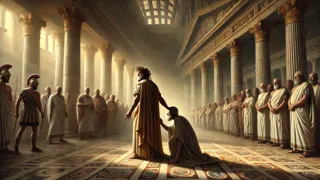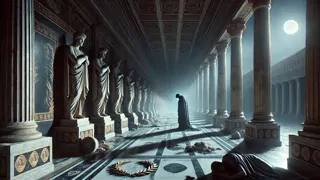Introduction
In the ochre haze of ancient Thebes, marble colonnades rise from dust, and the city’s fate is already etched in the minds of gods and mortals alike. This is a land where oracles whisper doom from temple shadows and the wind carries prophecies through olive groves. Here, the people of Thebes are suffocating under a plague so ruthless that each dawn brings the wail of new sorrow. Animals perish in the fields, crops rot before harvest, and mothers cradle lifeless children while priests heap sacrifices on Apollo’s altar. At the heart of this suffering stands Oedipus, their king—a man celebrated for his wisdom and quick mind, whose past victory over the Sphinx once crowned him savior and ruler. Yet, beneath the laurels and gold, a silent dread gnaws at him. Oedipus is a stranger to his own beginnings, a child found abandoned, scarred and swaddled, and raised far from the city he now governs. With unyielding resolve, he vows to end the misery wracking his people, unaware that the path to salvation will drag him closer to a horrifying truth. In a palace layered with secrets and corridors echoing with the voices of ancestors, Oedipus’s relentless pursuit of justice will awaken ghosts, unravel the fabric of his family, and fulfill a prophecy woven long before his first breath. This is not only the tragedy of a king, but of a city, a lineage, and the very nature of human knowledge—the desperate urge to see, no matter the cost. In this retelling, we journey through the marble courts and shadowed chambers of Thebes to witness a story where fate cannot be outrun, and where the greatest act of heroism is also the cruelest twist of destiny.
The Shadows of Prophecy
Thebes, once vibrant, now suffocates under the weight of the gods’ anger. The air hangs heavy with incense and rot, and in the city’s heart, King Oedipus rises daily to pleas for deliverance. Since he vanquished the Sphinx and assumed the throne, he’s been lauded as Thebes’ redeemer. Yet these days, the acclamation tastes bitter, for suffering engulfs the city despite his might.

He paces the palace, a fortress of marble and mystery, its walls alive with murals of old victories and warnings. Priests gather in the courtyard, bearing laurel branches and shrouded in white. At dawn, Kreon—Oedipus’s trusted brother-in-law—returns from Delphi’s oracle, face grave and eyes clouded with dread. The message from Apollo is simple, chilling: the plague will end only when the murderer of King Laius, Oedipus’s predecessor, is found and exiled or slain.
Oedipus’s jaw tightens. He swears before assembled nobles and citizens that he will hunt down the killer, no matter the cost. His vow is more than kingly duty; it’s a personal crusade. He orders a search for Tiresias, the blind seer. Some whisper it’s madness to pry into the past, that Thebes is cursed by something deeper than a single crime. But Oedipus cannot abide passivity—every moment without action is another life lost.
The city’s elders recall Laius’s death years ago: slain at a crossroads by unknown assailants, a tragedy eclipsed by the Sphinx’s terror. Now, Oedipus commands his guards to re-investigate the crime, scouring Thebes for witnesses. Rumors swirl—some blame foreign bandits, others mutter about a solitary traveler fleeing the scene. The truth slips through their fingers like water.
When Tiresias arrives, led by a boy’s hand, his presence hushes the court. The seer’s face is lined by the sun and by secrets, and he’s reluctant to speak. Oedipus, frustrated, presses him harshly. Tiresias’s silence yields only under insult; he warns Oedipus that the king himself is the city’s curse, the very source of its corruption. The accusation bursts through the hall like thunder. Oedipus recoils, then lashes out, suspecting Kreon and Tiresias of treasonous conspiracy.
As tensions rise, Queen Jocasta—Oedipus’s wife and Laius’s widow—tries to soothe him. She laughs away prophecy, insisting that oracles are unreliable. After all, Laius was once told by Apollo that he’d die by his own son’s hand, yet the infant was abandoned on Mount Cithaeron long ago. Oedipus listens, uneasy, haunted by flashes of memory: his own childhood in distant Corinth, the drunken accusation that he was not his parents’ son, his desperate flight from home, and a violent encounter at a fateful crossroads.
A cold dread seeps into his bones. He orders messengers to summon the lone survivor of Laius’s attack and to fetch the shepherd who once found an abandoned infant on the mountain’s slopes. In palace corridors, whispers grow louder. Jocasta grows pale and withdrawn. Oedipus’s resolve hardens into obsession; he will expose every secret, no matter how painful. The city holds its breath, watching their king unravel threads that bind not just his fate, but the fate of all Thebes.
The Revelation and the Fall
The days grow longer as Oedipus’s search for truth devours him. Jocasta’s laughter fades, replaced by furtive glances and trembling hands. Outside, Thebans gather at temples and street corners, their hope shifting to dread as rumors ripple through the city.

News comes first from the Corinthian messenger: Polybus, Oedipus’s supposed father, is dead. The king grieves, but the messenger brings another revelation. Polybus and Merope were not Oedipus’s birth parents. Years ago, a shepherd delivered a swaddled infant—ankles pinned and bleeding—to Polybus’s court, a child rescued from death on Cithaeron. Jocasta’s face blanches as she listens, her breath caught between past and present.
The final piece arrives with the Theban shepherd who survived Laius’s murder. Pressed by Oedipus’s relentless questioning, he confesses: it was he who handed over the infant, following Jocasta’s desperate orders to save her son from Apollo’s cruel decree. The crossroads fight bursts into Oedipus’s mind—the stranger he killed in self-defense was Laius, his own father. The horror crystallizes. His life has been a circle of unwitting sin: Oedipus has slain his father and married his mother, fulfilling the prophecy he tried so hard to evade.
Jocasta flees the hall in a silence deeper than any wail. Moments later, attendants burst into her chambers and find her lifeless, a noose drawn from her own robes. Oedipus follows, and the sight of her broken body shatters him. In a frenzy of grief and guilt, he blinds himself with her golden brooches, gouging his own eyes to escape the agony of truth. Blood streams down his cheeks as he staggers back into the light, a king stripped bare, begging the gods and the city for exile.
Kreon, stunned but resolute, steps forward to assume control. The people, torn between pity and revulsion, mourn for their fallen king and queen. Oedipus, ruined and pitiful, pleads only to be cast from Thebes—to wander blind and alone, cut off from all comfort. His children gather around him: Antigone, devoted and heartbroken; Ismene, trembling; and his sons, silent in shock.
Through the city gates, Oedipus departs—once a hero, now an outcast. Thebes is left with its suffering eased but its soul scarred by the cost. The prophecy is fulfilled not by malice but by ignorance and fate, a lesson carved into the city’s memory for generations to come.
Conclusion
The tale of Oedipus Rex endures because it mirrors humanity’s deepest anxieties: that our fates may be fixed by forces we can’t see or understand, and that the search for truth can demand unbearable sacrifices. In Thebes, the echoes of Oedipus’s tragedy linger long after he stumbles into exile, a testament to the price of knowledge and the cruelty of prophecy. Yet within this sorrow lies an indelible wisdom—the courage to confront even the darkest revelations, the humility to accept our own blindness, and the resilience to carry on despite insurmountable loss. The city that once celebrated its king now mourns both his downfall and the innocence lost with it. From these ruins, future generations will debate the meaning of fate and free will, and wonder whether any mortal can truly escape the designs of the gods. The marble palaces may crumble, but Oedipus’s story remains carved in the heart of Western storytelling, a reminder that tragedy is not simply about downfall, but about the enduring quest to know ourselves—no matter how painful that knowledge may be.


















